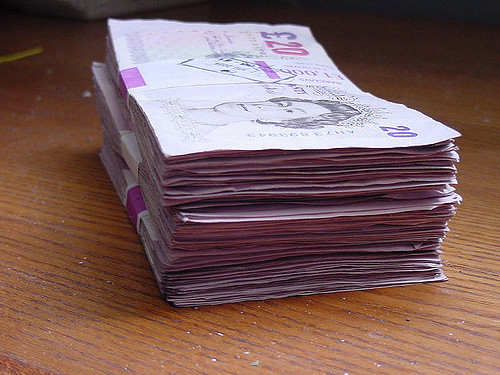The British government recently forced the BBC to disclose the wages of some of its most highest-paid stars. “Forced” seems to be the operative word here, as the results were (predictably, depressingly) less-than-stellar with regards to the wage gap.
For example: the BBC’s highest-paid star, Chris Evans (no, not Cap), sits comfortably in his own £2,220,000 to £2,249,999 bracket. Next highest is Graham Norton, who brings home somewhere between £850,000 and £899,999. But the highest-paid female star? Claudia Winkleman, who sits in the £450,000 to £449,999 bracket. Nearly two-thirds of the highest paid talent on the BBC are men.
It’s important to note that many of the BBC’s high-profile stars aren’t included in this list. As explained in The Guardian, the list “does not include payments to staff from production companies or BBC Worldwide, which generates commercial revenues. This means there are some high-profile BBC figures not included such as the stars of The Great British Bake Off, Sherlock star Benedict Cumberbatch, and Sir David Attenborough.” For the most part, the list seems to focus on news presenters and television personalities.
BBC’s director general Tony Hall commented on the wage gap in The Guardian, first citing the network’s struggle to compete against other entertainment vectors, including streaming television. Hall said, “Chris Evans is presenting the most popular show on the most popular network in Europe. Chris Evans would have a choice [of jobs], it might not be commercial radio but we do know that a number of presenters have been made offers by commercial radio. We also know we have lost people, not Chris, to Amazon and other big players. That is the market we are dealing with.”
Then Hall pivoted, touting the BBC’s dedication to parity in representation as well as pay. He insists that the BBC is “more diverse than the broadcasting industry and the civil service.” He continued, “I feel reinvigorated in one of the things I really believe, which is getting by 2020 equality on the air between men and women and in pay as well.”
To his credit, Hall seems to understand that yes, diversity means more than just representation both before and behind the camera. It’s one thing to be dedicated to hiring women, but it’s a whole separate issue when it comes to making sure they’re paid fairly—with “fairly” being relative here, as we’re talking about some salaries that are pretty sky-high to you and I. Mishal Husain, a British news presenter, confronted Hall about his comments about the BBC’s dedication to gender and pay parity. She asked, “So by 2020 you’re going to close the gender pay gap – by putting the overall wage bill up?” Hall more or less ducked the question, saying, “We’ll have to manage the overall wage bill as you very well know the settlement we have with the Government means we have a flat rate of funding for the next five years. We have to manage, as we do, within our means.” In other words: we’ll see.
But here’s the thing that really sticks in my craw: both women and men of color seem scarce on this earnings list. And of course, I’ll admit here that my knowledge of BBC television personalities perhaps isn’t the best, but with the exception of Mishal Husain, who sits in the £200,000 to £249,999 bracket, many of the stars cited as being on the highest-paid lists are white. What’s up with that?
For the most part, much of the coverage around the BBC’s discrepancy focuses on the gap between men and women. While this is an absolutely incredibly important discussion to have, I think that when it comes to closing the wage gap, men and women of color certainly should be involved in the debate, too. Equality along all lines is the end goal here, and if we forget about our intersectionality, then all we’re fighting for is inches when really, we should be taking miles.
(via Jezebel, image: Flickr/n0comment)
Want more stories like this? Become a subscriber and support the site!
—The Mary Sue has a strict comment policy that forbids, but is not limited to, personal insults toward anyone, hate speech, and trolling.—









Published: Jul 19, 2017 12:17 pm